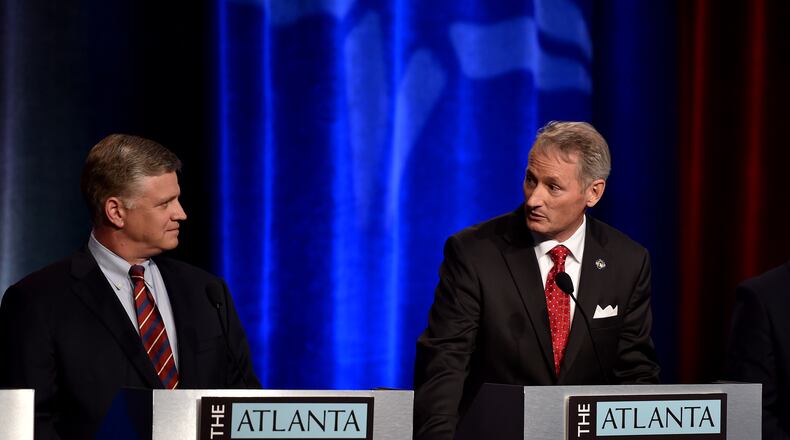If you live in west-central Georgia, you've probably been inundated lately with mailers, attack ads and phone calls surrounding the hotly contested 3rd District GOP runoff for the congressional seat being vacated by Lynn Westmoreland.
It's almost over – Republican voters in the 3rd District hit the polls tomorrow to decide between former West Point Mayor Drew Ferguson and state Sen. Mike Crane. (Check out our race primer here.)
But because your Political Insiders know how to have fun in this stifling heat we wanted to share a few of the numbers we mined from the Federal Election Commission and the money-in-politics website Open Secrets over the weekend.
First, here's a pretty staggering top-line: $2.15 million. That's how much Super PACs and other groups outside of Georgia have spent trying to influence the race to date.
That’s certainly a lot of moolah for a House seat, but it makes a little more sense once you consider that the contest has become a proxy battle between two forces duking it out for control of the Republican Party: the traditional, business-oriented “establishment” (Ferguson) and the more ideologically pure insurgency (Crane).
As we’ve seen in the years since the Supreme Court’s landmark Citizens United case in 2010, most of the money that’s been poured in this race has come in the form of independent expenditures. Corporations and unions can spend unlimited amounts of money convincing people to vote for or against candidates as long as they’re not coordinating with the campaigns themselves.
Far and away the biggest spender in this race has been the Super PAC arm of the Club for Growth, a lobbying group focused on free market principles and shrinking the size of government. They’ve spent nearly $814,000 in Georgia on attack ads against Ferguson. Crane also received help from the Senate Conservatives Fund, a tea party-aligned group founded by former South Carolina Sen. Jim DeMint.
Ferguson wasn’t exactly on his own either. The dentist ultimately received the most help from outside groups, which spent more than $1.3 million in advertisements either supportive of him or against Crane.
His biggest benefactor was the U.S. Chamber of Commerce, which committed to more than $650,000 in supportive advertising. The Ending Spending Action Fund, which is focused on slashing federal spending, spent more than $488,000 attacking Crane. Ferguson also saw money from the American Dental Association’s Super PAC.
All of that money completely trumps the dough raised and spent by the campaigns themselves.
Ferguson ultimately reported stronger fundraising numbers than Crane. He’s raised more than $784,000 since starting his congressional bid, compared to Crane’s $420,000.
But numbers are only one part of the equation. The two men virtually tied in the May 24 primary, and this has been an entirely unpredictable political year. We'll be watching closely as the returns roll in tomorrow.
The winner of the GOP runoff will face Democrat Angela Pendley in November.
About the Author
The Latest
Featured




